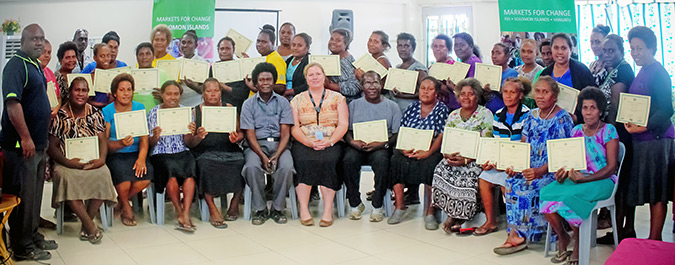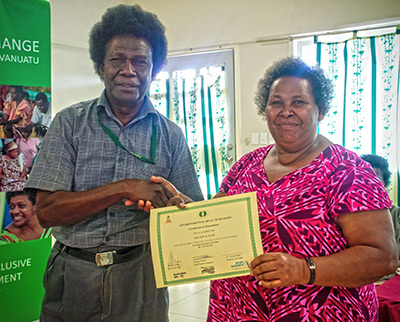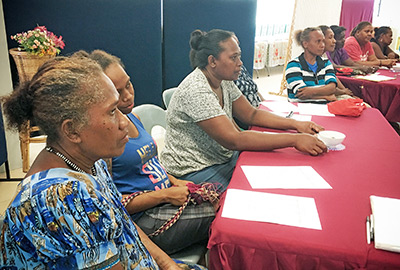Honiara Central Market Vendors undertake Food Safety and Hygiene Training
Date:
[Press Release]

Solomon Islands — “The training is very useful,” a participant at the food safety and handling training, indicating that it is the small things that make a big difference.
“When we do not take good care of food when preparing it, it will be a hazard for us and our customers,” she said.
A Food Safety and Hygiene training was held from 21-24 July, facilitated by the Honiara City Council (HCC) Environmental Health Division and supported by UN Women’s Markets for Change (M4C) project. Thirty-two market vendors from Honiara Central Market participated in the training.

George Titiulu, Chief Health Inspector for Environment Health Division for HCC said this is the second round of training that M4C has supported for food market vendors at the Honiara Central Market.
“There is a lot of things to be done in terms of food safety and hygiene, especially with market vendors. They really need to understand that food safety and hygiene is very important because it will help them to take the precautionary measures to avoid food contamination as well as food born illness.”

“So the importance of this training is to teach them food hygiene practices so that consumers get an assurance from them” Mr Titiulu added.
Mr. Titiulu thanked UN Women for supporting the market vendors with training: “Partnership is the way forward to address such issues as food safety and hygiene as it does not belong to one sector.”
The Pure Food Act 1996 in Solomon Islands requires all food sellers in public spaces to undergo the Food Safety and Hygiene training and be issued with a certificate before they can sell cooked food.

During the training, participants learned about causes of food borne illnesses, five keys to safe food, kitchen structure, design and layout, waste and pest control management, food and nutrition, roles of food handlers, health inspector and legislation.
Kristy Nowland, Project Manager for UN Women’s Markets for Change in Solomon Islands, said the project is committed to supporting initiatives such as this training, that will lead to the economic empowerment of women.
“Many of these women are learning about food safety and hygiene for the first time – immediately they understand how important safe food practice is,” Ms Nowland said, adding that: “not only is it good practice, but vendors know that safe food means happy customers and a healthy business. Putting this training into practice, vendors to feel confident in looking after their customer’s health and ensuring the reputation of their business.”
UN Women’s Markets for Change (M4C) project is a six-year, multi-country initiative that aims to ensure marketplaces in rural and urban areas of Fiji, Solomon Islands and Vanuatu are safe, inclusive and non-discriminatory, promoting gender equality and women’s empowerment. A UN Women project, M4C is principally funded by the Australian Government, and implemented in partnership with UNDP.
BACKGROUND INFORMATION
UN Women’s Markets for Change project: UN Women’s Markets for Change (M4C) project is a key component of its Women’s Economic Empowerment programme. M4C is a six-year, multi-country initiative that aims to ensure marketplaces in rural and urban areas of Fiji, Solomon Islands and Vanuatu are safe, inclusive and non-discriminatory, promoting gender equality and women’s empowerment. A UN Women project, Markets for Change is implemented in partnership with UNDP and principally funded by the Australian Government.
Between 75-90 per cent of vendors working at Pacific marketplaces are women and their earnings often make up a significant portion of the incomes of many poor households. Despite this, women are often excluded from market governance and decision-making. M4C works with stakeholders, service providers and the market vendors themselves to: build and support inclusive, effective and representative advocacy groups; deliver appropriate services, training and interventions; ensure women’s voices are heard and taken into account at the decision-making level; and to improve physical infrastructure and operating systems.
Media enquiries should be directed to:
Sharon Tohaimae
Communications and Monitoring and Evaluation Officer, Markets for Change
UN Women
Phone: (+677) 22463
Email: [ Click to reveal ]
For further information please visit:
Fiji.unwomen.org
Facebook.com/unwomenpacific
Twitter.com/unwomenpacific